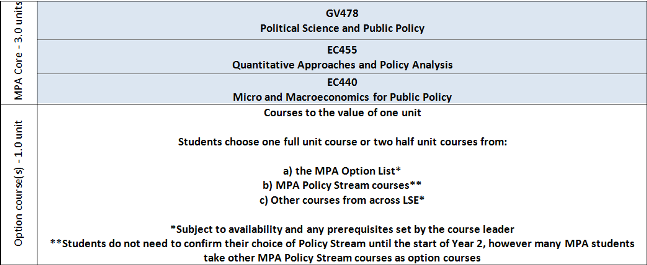
The LSE MPA programme is designed to give students flexibility and choices. There are:
- compulsory courses
- policy stream courses
- option courses
- half-units
- full-units
- dissertations and policy papers
Intrigued? Confused? We spoke to Michelle Batten, the MPA Programme Manager to help us find a way through the maze of available courses. Read on to find out more…
Let’s start at the beginning, Michelle. What does the first year curriculum of the MPA look like?
Actually, it all starts before the first year: there is an MPA introductory course on Maths and Statistics two weeks before the official start of term. This course will make sure that all our students are familiar with the skills required to take on the rest of the degree. There is no pass or fail, and it does not affect your final MPA result. Once that’s done, the first year of the LSE MPA programme is designed to give students a strong theoretical and technical base which they can take forward into their second year Capstone Projects, policy stream courses and option courses.
Students take four course units in each year of the MPA programme.
What do you mean by an option course?
An option course is one students can decide to study or not. In some educational systems, these are called ‘electives’. At the LSE, they are called ‘option courses’ – it is basically the same thing.
So which courses are compulsory?
There are three compulsory full-unit first year courses:
EC440 Micro and Macroeconomics for Public Policy
EC455 Quantitative Approaches and Policy Analysis
GV478 Political Science and Public Policy
Sometimes it’s easier to think about this in a chart, like this one:

Are all the courses taught in large lecture halls or can I work in smaller groups and ask questions?
The answer is both – all these courses are taught through a combination of lectures attended by all students taking the course and smaller classes/seminars (usually with 12-15 students per group). So there is plenty of opportunity to get into the detail of subjects with your class or seminar tutors. These compulsory courses also serve to embed a sense of community among the MPA year group.
Some students will have studied economics before. Do they still have to study the first year economics courses?
Students with previous experience in economics can choose to take an EC440 exemption test shortly after arriving at the LSE. If they pass the exemption test, they can take another course in place of EC440. The exemption test does not require advance preparation and its outcome is not included in your MPA degree results. Those who already have a sufficient level of knowledge of economics will pass it and those who do not will study EC440.
All first year MPA students are required to take EC455.
OK, so that has clarified the compulsory courses – what about my option courses in the first year?
Students have a choice of subjects to study for the fourth course unit of Year 1. Many first year students take an MPA policy stream course as their fourth first year course unit. This does not commit them to choosing that particular policy stream at the start of their second year. However, it does mean they will be taking a course specifically designed for MPA students. Some MPA students choose outside option courses run by other LSE Departments.
What is the difference between a full-unit course and a half-unit course?
Full unit courses run all year and half-unit courses run in just one term. LSE has two main teaching terms; Michaelmas Term which runs from September to December, and Lent Term which runs from January to March. The Summer Term (April-June) is largely taken up with exams. There is no restriction on the number of half-units a student can take within the total number of course units required for their programme, but a high number of half-units can mean a high number of exams in Summer Term!
Find out more information about the second year of the MPA’s curriculum.




